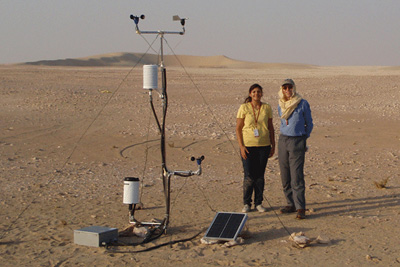Cornell research on sand dunes wins award
By Susan S. Lang

A Weill Cornell Medical College in Qatar (WCMC-Q)/Cornell research project to better understand microbes in sand dunes and engineer microbiological methods to prevent mobile sand dunes from encroaching onto infrastructure won the "Best Environment Research Program of the Year" at the Annual Research Forum of the Qatar Foundation in Doha, Nov. 21. The award included a $100,000 prize to extend the research.
The project, sponsored by the Qatar National Research Foundation, is a collaboration among Cornell's Anthony Hay, associate professor of microbiology, and Michel Louge, professor of mechanical engineering, WCMC-Q's Christopher Ogden, Renee Richer, Sara Abdul-Majid and Joel Malek, and scientists at the University of Michigan, Universities of Rennes and Nantes in France and the University of Nouakchott in Mauritania.
"The project's objective is to understand whether and how microbes can survive on moisture stored in mobile (wind-driven) desert sand dunes," explained Louge. "It has two principal components: physical measurements and numerical models of moisture balance in mobile dunes, conducted in Qatar and Mauritania, and microbiological analyses of samples collected in those dunes, including DNA/RNA extraction and sequencing. The ultimate goal of the research is to engineer microbiological methods to fix mobile dunes and prevent them from encroaching onto infrastructure."
The Atkinson Center for a Sustainable Future at Cornell provided a travel grant that allowed Hay and Louge to meet their collaborators in Doha in March 2009. During that trip, they collected sand samples, selected a test site, conducted preliminary microbiological and physical analyses, and outlined this research program, which eventually won a $1 million grant from the Qatar National Research Foundation in December 2010.
Media Contact
Get Cornell news delivered right to your inbox.
Subscribe